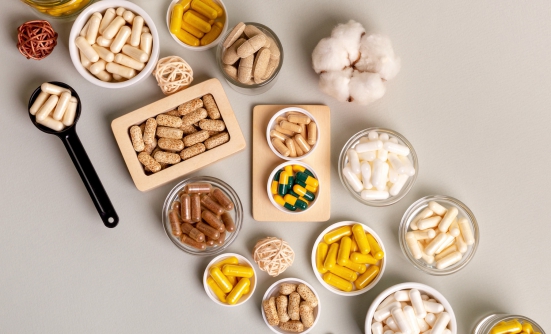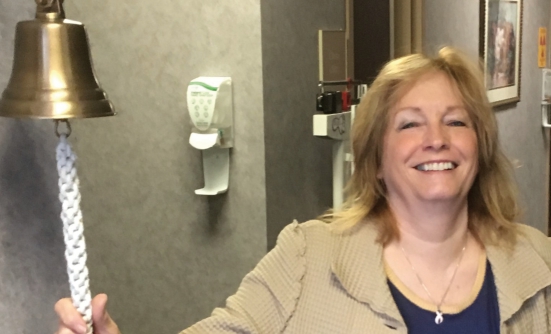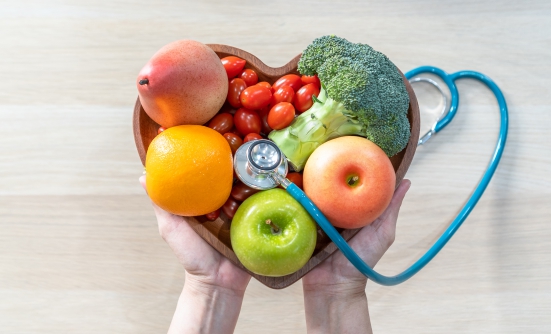The human body is made of 70% water. Although the body can function for weeks without food, it cannot sustain itself for more than a few days without water. Water—this simple substance of hydrogen and oxygen—plays a role in controlling heart rate and blood pressure, regulating body temperature, lubricating joints, and creating saliva for digestion. Water also helps remove waste and toxins and transports nutrients throughout the body. Water is vital for life, and it is of utmost importance for someone undergoing cancer treatment.
Dehydration and Cancer Treatment
Dehydration occurs when the body loses more water than it takes in. Patients with cancer are at risk for dehydration from nausea, vomiting, diarrhea, fever, and medications that may be used for treatment. Water loss can also occur from being in a hot environment or from exercising and sweating. It can be a challenge to stay well-hydrated during cancer treatment.
Chemotherapy can affect taste, and many people find that water tastes metallic. Fatigue and nausea can affect your desire to drink. The sensation of thirst may be diminished. Dehydration can make nausea and fatigue worse, creating a downward cycle. Dehydration also makes it difficult for the body to flush out medications and chemotherapy, putting stress on the kidneys.
The Symptoms
The signs and symptoms of dehydration, such as fatigue, nausea, vomiting, constipation, headache, and dizziness, may be mistaken for other issues. So how can you tell if you are getting enough fluids?
The easiest way is to count the number of cups of fluid you drink in the day. The goal is to drink at least ten 8-ounce glasses of fluid every day. That amount should increase if you have diarrhea, vomiting, or a fever.
Don’t count on thirst to tell you when you need to drink. Always keep a beverage with you, so you can take sips throughout the day. A portable insulated container can make it easier to track the amount you drink. Set an alarm on your smartphone, if that will help remind you to drink every hour.
What Drink Is Best?
Although water is the best form of hydration, it may not be appealing when undergoing cancer treatment. One trick for making water more palatable is to add sliced citrus fruit or cucumber. Sugary drinks, such as soda pop and juices, should be limited or avoided, but a splash of fruit juice can give water a pleasant flavor. Ice chips are also a good option when drinking is difficult.
Anything that is a liquid at room temperature counts as a fluid. Grapes, melon, broth, soup, and fruit juice popsicles are other options. Herbal teas and green teas are soothing and can be enjoyed hot or iced.
Coconut water is flavorful and packed with antioxidants and minerals, such as potassium, magnesium, sodium, and zinc. Fruit smoothies and nondairy beverages, such as almond or cashew milk, contain vitamins and antioxidants, and have the added benefit of boosting calories.
Make Your Own Energy Drink
Many people rely on energy drinks to stay hydrated. These drinks do contain electrolytes, but they also contain a high amount of sugar and artificial colors and additives. A better alternative is to make your own energy drink. It is healthier and much less expensive:
- Start with 3 cups of liquid (coconut water, herbal tea, or water)
- Add 1/2 cup lemon, lime, cranberry, or orange juice
- Mix in 1/4 teaspoon of sea salt and 2 tablespoons of maple syrup
Tell Your Doctor
There may be times, despite best efforts, that it becomes difficult to stay well-hydrated. If you have nausea, vomiting, or diarrhea that persists, or you have a dry mouth and dry tongue, you feel fatigued and dizzy, or your urine is a dark yellow color, you may be dehydrated. It is important to tell your doctor if you have any of these symptoms, so that they can be treated promptly.
Prevention
Prevention is the best medicine. Make it a habit to drink at least ten 8-ounce glasses of fluid every day. Try different fruits and beverages if water is not appealing to you. Keep a beverage by your side and take sips throughout the day. Fluids help the body flush out waste and toxins, and help decrease fatigue, constipation, nausea, and physical weakness.
Focus on staying well-hydrated during cancer treatment to prevent the risk of dehydration and help your body heal and recover.
Key Points
- It can be a challenge to stay well-hydrated during cancer treatment
- The goal is to drink at least 10 8-ounce glasses of fluid every day, or more if you have diarrhea, vomiting, or a fever
- Don’t count on thirst to tell you when you need to drink; always keep a beverage with you
- Fluids help the body flush out waste and toxins and help decrease fatigue, constipation, nausea, and weakness
Patient Resources
Cancer.net
www.cancer.net/navigating-cancer-care/side-effects/dehydration
Chemocare
www.chemocare.com/chemotherapy/side-effects/dehydration.aspx
Cleveland Clinic
https://health.clevelandclinic.org/2015/02/4-things-you-should-know-about-cancer-and-dehydration












